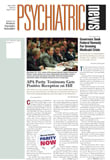Is APA’s Diagnostic and Statistical Manual of Mental Disorders world renowned? Absolutely. But could this famous nosology also be improved? Of course. And it is with an eye to making such improvement that APA is publishing a 300-page monograph this month titled A Research Agenda for DSM-V.
The editors of the monograph are David Kupfer, M.D., chair of psychiatry at the University of Pittsburgh; Michael First, M.D., a research psychiatrist at the New York State Psychiatric Institute; and Darrel Regier, M.D., executive director of the American Psychiatric Institute for Research and Education and director of APA’s Division of Research.
The agenda actually had its inception in 1999. APA Medical Director Steven Mirin, M.D.; Steven Hyman, M.D., then director of the National Institute of Mental Health; and Kupfer, chair of APA’s Committee on Psychiatric Diagnosis and Assessment, decided that it would be a good idea to bring researchers in neurobiology, genetics, and some other areas together to brainstorm how to ensure DSM-V might be placed on a firmer scientific footing than DSM-IV.
As First told Psychiatric News, “The idea was to cultivate research in advance of the DSM-V process to sow research seeds for DSM-V.”
The investigators whom Mirin, Hyman, and Kupfer decided to invite were, for the most part, not researchers who had been involved in previous DSM editions. “And part of the rationale for that,” First explained, “was that they wanted people who were not constrained, not too closely involved with the original process, who were thinking out of the box.”
In fall 1999 APA and NIMH cosponsored a research planning conference. As an outgrowth of this conference, work groups of investigators were formed to concentrate on areas deemed critical to improving DSM. In July 2000 Hyman and Kupfer met with Regier, who had recently joined APA, as well as with the heads of the work groups. Then in October 2000, the work group heads met with other work group members to further refine their strategies to set a research agenda (Psychiatric News, November 30, 2000). Now, almost two years later, the work groups have finished their work, and their recommendations are being published as the monograph A Research Agenda for DSM-V.
The monograph contains recommendations in the six different areas that the six work groups addressed: basic nomenclature issues, neuroscience and genetics, developmental diagnosis, gaps in the current diagnostic system, mental disorders and disability, and cross-cultural issues.
On page 113, for instance, the monograph states: “In one set of studies, potent risk factors for later psychiatric disorders have been identified among children whose symptoms do not meet current criteria for any categorical DSM-IV diagnoses. A few controlled prevention studies have begun to target such risk factors, but as knowledge of risk factors and their amenability to intervention increase, controlled prevention trials should also increase.”
On page 157, the monograph asserts: “It is important to investigate whether there is a core group of DSM personality disorders that are seen as pathological or dysfunctional in diverse ethnic groups. Furthermore, it should be determined whether there are personality disorders that exist in certain ethnic groups and cultures that are not contained in standard DSM nosology.”
And on page 215, the monograph declares: “As the field of psychiatric nosology moves forward in the era of genomics and more precise neuroscience, considerable opportunities exist to develop a much better understanding of the etiology and course of disability. This will best be accomplished by uncoupling disability and diagnosis. Disabilities warrant interventions that may differ from those needed for the relief of disease symptoms. Uncoupling the two concepts will facilitate research on the development of treatment for disabilities.”
“The major thrust of the monograph,” Kupfer told Psychiatric News, “is to highlight the need to search for new approaches to understanding pathophysiologic mechanisms that can both improve the validity of our diagnoses and increase the effectiveness of our treatment interventions. Rather than one specific recommendation, the major expectation was that these six work groups involving a number of interdisciplinary investigators and clinicians would develop chapters to encourage a research and analytic agenda that would integrate studies from basic/clinical neuroscience and behavior, epidemiology, clinical research, cross-cultural approaches, as well as approaches derived from clinical services.”
As Regier explained it: “The intent of this monograph is to stimulate additional research that will improve the validity of the criteria for psychiatric diagnoses. By that I mean criteria that will better describe the etiology or causes of disorders, the location in the brain where specific malfunctions are occurring, the underlying mechanisms or pathophysiology of mental disorders, the expected course of disorders, the effect of environmental and cultural influences on disorder expression, and the likely response to treatment. We will plan to assess the status of multiple research field contributions to this effort over the next five years before the diagnostic work groups are assembled to revise the DSM.”
Regier also said that he hopes that the monograph will stimulate research in other countries with a substantial research capacity. “Hence,” he said, “we will be presenting a prototype conference on depression at the World Conference of Psychiatry in Japan this month.”
A Research Agenda for DSM-V may be purchased from the American Psychiatric Publishing Inc. by calling (800) 368-5777 and asking for item number 2292; ISBN 0-89042-292-3. It may also be purchased online at www.appi.org. ▪
